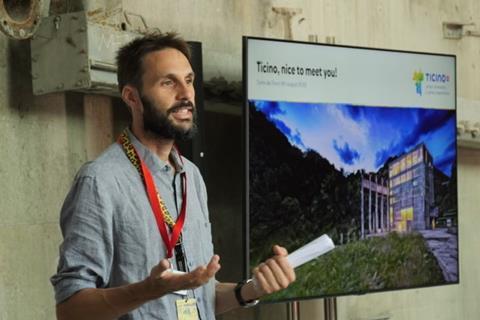
As the first week of the Locarno Film Festival (August 3-13) comes to an end, here is the latest from the industry side of the event in Switzerland.
Six projects at Locarno Pitching Day
Feature films from Italy, Austria and Switzerland were among the projects pitched at the Ticino Film Commission’s Locarno Pitching Day held yesterday (August 8).
Staged in collaboration with Locarno Pro, the event was aimed at film industry professionals seeking co-production partners, distribution and financing for projects that are in development and could be further developed in the Swiss region.
This year’s line-up included Italian writer-director Giada Bossi’s debut feature Candy Crush, to be produced by Milan/Rome-based Indiana Production; Ticino-based Ventura Film’s production of Swiss cinematographer-director Tomasso Donati’s debut Window On An Imaginary City; and Austrian director Thomas Woschitz’s baroque road movie The Beginning Of Gravity, which is being developed by Gabriele Kranzelbinder’s KGP and was presented at Locarno Pro’s Alliance 4 Development platform at the weekend.
Six projects in total were pitched to an international audience that included Francesca Delise, head of international sales at Italy’s Illmatic Film Sales, Miguel Dias, director of Portugal’s Curtas Vila do Conde Festival, French producer Thomas Lambert of Tomsa Films, and producer Corinne Rossi of Zurich-based Praesens-Film AG.
Collaborative venture between Swiss festivals
Ten Swiss film festivals have joined forces to celebrate cinema and their diversity in a programme of screenings running from September to June 2023 under the banner “10 Film Festival @ PalaCinema” in Locarno.
The initiative, the brainchild of Locarno’s former head of industry Nadia Dresti, will kick off on September 15 with Roberto Rossellini’s Roma Città Aperta, the choice of Locarno’s artistic director Giona A. Nazzaro.
It will be followed in monthly intervals by selections made by the directors of the Winterthur Short Film Days, Zurich Film Festival, Castellinaria - Festival del Cinema Giovane, Fantoche International Animation Film Festival, Fribourg International Film Festival, Solothurn Film Days, Neuchatel International Fantastic Film Festival, Geneva International Film Festival and Visions du Réel.
Zurich’s festival director Christian Jungen will present Jonas Carpignano’s drama A Chiara, while Fribourg’s Thierry Jobin has selected the 1977 omnibus film Viva Italia! by Mario Monicelli, Dino Risi and Ettore Scola.
Dresti said that her selection of the 10 festivals to participate in the initiative had been guided by those events which receive financial support from the Federal Office of Culture
“I asked them all to come to Locarno to present their particular vision of their festival and choose a film which represents their festival and this vision,” she explained. “Each film had to be in Italian or with Italian subtitles because the idea is to bring the local people from here in Ticino to come and see them at the PalaCinema.”
“It’s a very informal collaboration, but it’s good to show everyone that there is this connection between the Swiss festivals and this could lead to other initiatives in the future.”
Switzerland launches co-development fund for minority co-productions
Switzerland’s Federal Office of Culture (FOC) is set to join forces with MEDIA Desk Suisse to launch a support scheme from January 2023 for the co-development of minority co-productions.
The maximum contribution for co-developing a fiction project would be $52,500 (CHF 50,000), and $26,000 (CHF 25,000) for a documentary. The support can cover up to 70% of the Swiss development budget.
Corinna Marschall of MEDIA Desk Suisse said: “Our goal will be for Swiss elements to be anchored in a project as early as possible so that an artistic co-production as a co-creation rather than just a pooling of financial resources can be implemented.”
She added that these projects can have foreign screenwriters and that there would be an automatic bonus points system for children’s films and animation features, which often require bigger budgets.
The move by the FOC and MEDIA Desk Suisse comes in the wake of the European Union’s Creative Europe programme’s decision to introduce its European co-development programme earlier this year.
This requires projects to be co-developed by at least two European independent production companies from different countries and different markets.

























No comments yet